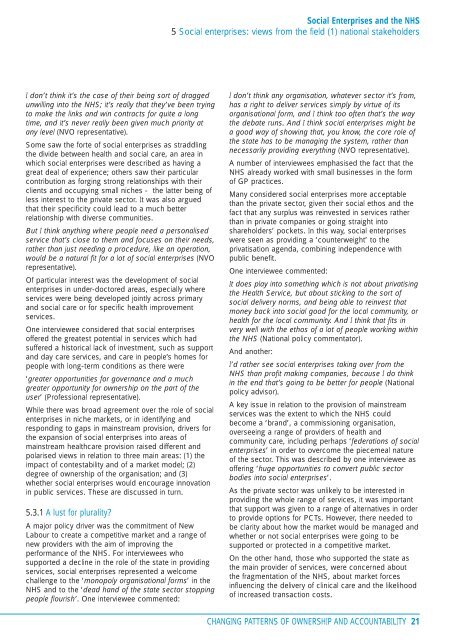Social Enterprises and the NHS - Unison
Social Enterprises and the NHS - Unison
Social Enterprises and the NHS - Unison
You also want an ePaper? Increase the reach of your titles
YUMPU automatically turns print PDFs into web optimized ePapers that Google loves.
I don’t think it’s <strong>the</strong> case of <strong>the</strong>ir being sort of dragged<br />
unwilling into <strong>the</strong> <strong>NHS</strong>; it’s really that <strong>the</strong>y’ve been trying<br />
to make <strong>the</strong> links <strong>and</strong> win contracts for quite a long<br />
time, <strong>and</strong> it’s never really been given much priority at<br />
any level (NVO representative).<br />
Some saw <strong>the</strong> forte of social enterprises as straddling<br />
<strong>the</strong> divide between health <strong>and</strong> social care, an area in<br />
which social enterprises were described as having a<br />
great deal of experience; o<strong>the</strong>rs saw <strong>the</strong>ir particular<br />
contribution as forging strong relationships with <strong>the</strong>ir<br />
clients <strong>and</strong> occupying small niches - <strong>the</strong> latter being of<br />
less interest to <strong>the</strong> private sector. It was also argued<br />
that <strong>the</strong>ir specificity could lead to a much better<br />
relationship with diverse communities.<br />
But I think anything where people need a personalised<br />
service that’s close to <strong>the</strong>m <strong>and</strong> focuses on <strong>the</strong>ir needs,<br />
ra<strong>the</strong>r than just needing a procedure, like an operation,<br />
would be a natural fit for a lot of social enterprises (NVO<br />
representative).<br />
Of particular interest was <strong>the</strong> development of social<br />
enterprises in under-doctored areas, especially where<br />
services were being developed jointly across primary<br />
<strong>and</strong> social care or for specific health improvement<br />
services.<br />
One interviewee considered that social enterprises<br />
offered <strong>the</strong> greatest potential in services which had<br />
suffered a historical lack of investment, such as support<br />
<strong>and</strong> day care services, <strong>and</strong> care in people’s homes for<br />
people with long-term conditions as <strong>the</strong>re were<br />
‘greater opportunities for governance <strong>and</strong> a much<br />
greater opportunity for ownership on <strong>the</strong> part of <strong>the</strong><br />
user’ (Professional representative).<br />
While <strong>the</strong>re was broad agreement over <strong>the</strong> role of social<br />
enterprises in niche markets, or in identifying <strong>and</strong><br />
responding to gaps in mainstream provision, drivers for<br />
<strong>the</strong> expansion of social enterprises into areas of<br />
mainstream healthcare provision raised different <strong>and</strong><br />
polarised views in relation to three main areas: (1) <strong>the</strong><br />
impact of contestability <strong>and</strong> of a market model; (2)<br />
degree of ownership of <strong>the</strong> organisation; <strong>and</strong> (3)<br />
whe<strong>the</strong>r social enterprises would encourage innovation<br />
in public services. These are discussed in turn.<br />
5.3.1 A lust for plurality?<br />
A major policy driver was <strong>the</strong> commitment of New<br />
Labour to create a competitive market <strong>and</strong> a range of<br />
new providers with <strong>the</strong> aim of improving <strong>the</strong><br />
performance of <strong>the</strong> <strong>NHS</strong>. For interviewees who<br />
supported a decline in <strong>the</strong> role of <strong>the</strong> state in providing<br />
services, social enterprises represented a welcome<br />
challenge to <strong>the</strong> ‘monopoly organisational forms’ in <strong>the</strong><br />
<strong>NHS</strong> <strong>and</strong> to <strong>the</strong> ‘dead h<strong>and</strong> of <strong>the</strong> state sector stopping<br />
people flourish’. One interviewee commented:<br />
<strong>Social</strong> <strong>Enterprises</strong> <strong>and</strong> <strong>the</strong> <strong>NHS</strong><br />
5 <strong>Social</strong> enterprises: views from <strong>the</strong> field (1) national stakeholders<br />
I don’t think any organisation, whatever sector it’s from,<br />
has a right to deliver services simply by virtue of its<br />
organisational form, <strong>and</strong> I think too often that’s <strong>the</strong> way<br />
<strong>the</strong> debate runs. And I think social enterprises might be<br />
a good way of showing that, you know, <strong>the</strong> core role of<br />
<strong>the</strong> state has to be managing <strong>the</strong> system, ra<strong>the</strong>r than<br />
necessarily providing everything (NVO representative).<br />
A number of interviewees emphasised <strong>the</strong> fact that <strong>the</strong><br />
<strong>NHS</strong> already worked with small businesses in <strong>the</strong> form<br />
of GP practices.<br />
Many considered social enterprises more acceptable<br />
than <strong>the</strong> private sector, given <strong>the</strong>ir social ethos <strong>and</strong> <strong>the</strong><br />
fact that any surplus was reinvested in services ra<strong>the</strong>r<br />
than in private companies or going straight into<br />
shareholders’ pockets. In this way, social enterprises<br />
were seen as providing a ‘counterweight’ to <strong>the</strong><br />
privatisation agenda, combining independence with<br />
public benefit.<br />
One interviewee commented:<br />
It does play into something which is not about privatising<br />
<strong>the</strong> Health Service, but about sticking to <strong>the</strong> sort of<br />
social delivery norms, <strong>and</strong> being able to reinvest that<br />
money back into social good for <strong>the</strong> local community, or<br />
health for <strong>the</strong> local community. And I think that fits in<br />
very well with <strong>the</strong> ethos of a lot of people working within<br />
<strong>the</strong> <strong>NHS</strong> (National policy commentator).<br />
And ano<strong>the</strong>r:<br />
I’d ra<strong>the</strong>r see social enterprises taking over from <strong>the</strong><br />
<strong>NHS</strong> than profit making companies, because I do think<br />
in <strong>the</strong> end that’s going to be better for people (National<br />
policy advisor).<br />
A key issue in relation to <strong>the</strong> provision of mainstream<br />
services was <strong>the</strong> extent to which <strong>the</strong> <strong>NHS</strong> could<br />
become a ‘br<strong>and</strong>’, a commissioning organisation,<br />
overseeing a range of providers of health <strong>and</strong><br />
community care, including perhaps ‘federations of social<br />
enterprises’ in order to overcome <strong>the</strong> piecemeal nature<br />
of <strong>the</strong> sector. This was described by one interviewee as<br />
offering ‘huge opportunities to convert public sector<br />
bodies into social enterprises’.<br />
As <strong>the</strong> private sector was unlikely to be interested in<br />
providing <strong>the</strong> whole range of services, it was important<br />
that support was given to a range of alternatives in order<br />
to provide options for PCTs. However, <strong>the</strong>re needed to<br />
be clarity about how <strong>the</strong> market would be managed <strong>and</strong><br />
whe<strong>the</strong>r or not social enterprises were going to be<br />
supported or protected in a competitive market.<br />
On <strong>the</strong> o<strong>the</strong>r h<strong>and</strong>, those who supported <strong>the</strong> state as<br />
<strong>the</strong> main provider of services, were concerned about<br />
<strong>the</strong> fragmentation of <strong>the</strong> <strong>NHS</strong>, about market forces<br />
influencing <strong>the</strong> delivery of clinical care <strong>and</strong> <strong>the</strong> likelihood<br />
of increased transaction costs.<br />
CHANGING PATTERNS OF OWNERSHIP AND ACCOUNTABILITY 21















